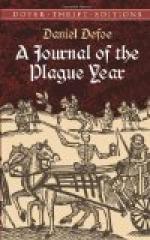In 1701 Defoe published his “True-born Englishman,” a satire upon the English people for their stupid opposition to the continental policy of the King. This is the only metrical composition of prolific Daniel that has any pretensions to be called a poem. It contains some lines not unworthy to rank with those of Dryden at his second-best. For instance, the opening:—
“Wherever God erects
a house of prayer,
The Devil always builds a
chapel there;
And ’twill be found
upon examination
The latter has the largest
congregation.”
Or, again, this keen and spirited description of the origin of the English race:—
“These are the heroes
that despise the Dutch,
And rail at newcome foreigners
so much,
Forgetting that themselves
are all derived
From the most scoundrel race
that ever lived;
A horrid crowd of rambling
thieves and drones,
Who ransacked kingdoms and
dispeopled towns:
The Pict and painted Briton,
treach’rous Scot
By hunger, theft, and rapine
hither brought;
Norwegian pirates, buccaneering
Danes,
Whose red-haired offspring
everywhere remains:
Who, joined with Norman French,
compound the breed
From whence your true-born
Englishmen proceed.”
Strange to say, the English people were so pleased with this humorous sketch of themselves, that they bought eighty thousand copies of the work. Not often is a truth teller so rewarded.
Not unnaturally elated by the success of this experiment, the next year Defoe came out with his famous “Shortest Way with the Dissenters,” a satire upon those furious High Churchmen and Tories, who would devour the dissenters tooth and nail. Unfortunately, the author had overestimated the capacity of the average Tory to see through a stone wall. The irony was mistaken for sincerity, and quoted approvingly by those whom it was intended to satirize. When the truth dawned through the obscuration of the Tories’ intellect, they were naturally enraged. They had influence enough to have Defoe arrested, and confined in Newgate for some eighteen months. He was also compelled to stand in the pillory for three days; but it is not true that his ears were cropped, as Pope intimates in his
“Earless on high stood unabashed Defoe.”




